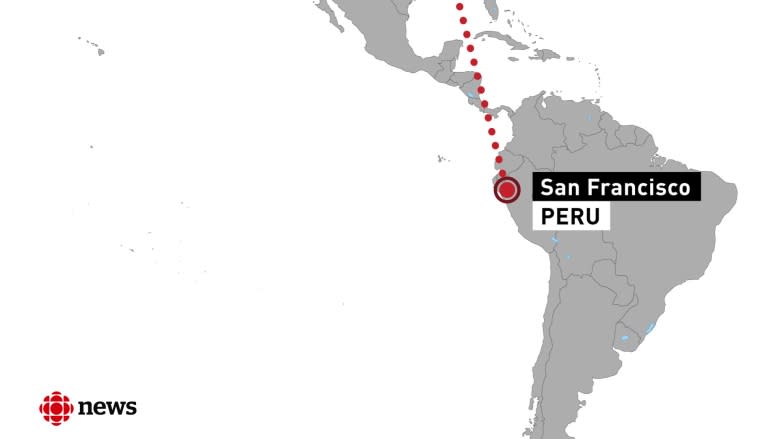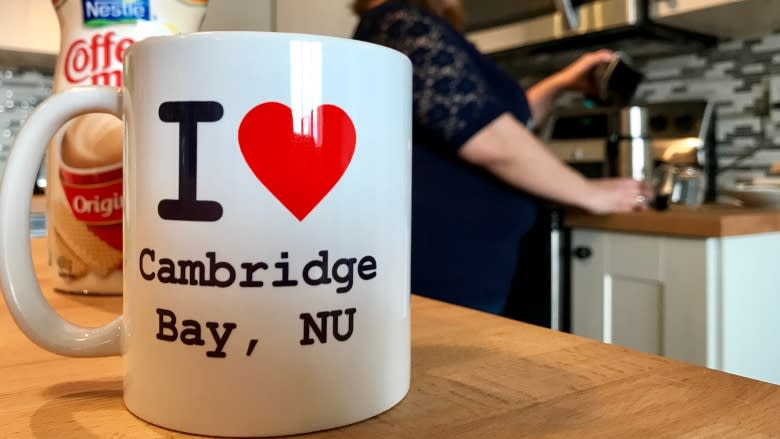Toasting to roasting: Inuit-owned coffee company teams up with Indigenous farmers in Peru
The idea began brewing over a pot of steaming coffee.
That's how Pamela Gross describes launching Kaapittiaq, a new Inuit-owned coffee company rooted in Cambridge Bay, Nunavut.
"What more of a way to feel proud of our culture than having a business that's Inuit owned and run," said Gross.
Kaapittiaq means "good coffee" in Inuinnaqtun, a regional Inuit language in western Nunavut. Gross is the executive director of the Kitikmeot Heritage Society, which owns Kaapittiaq.
The society hopes to create a steady stream of funding for cultural programs such as parka and qulliq-making workshops, and teaching children their Inuinnaqtun language.
But while researching how to get into the industry, Gross says, she learned the business could also help indigenous coffee bean farmers in Peru, by buying the beans directly from them.
"They have the climate to grow the beans and harvest them," said Gross.
"We have the opportunity to sell them to different people who come up north."
North-south connection
Kaapittiaq is sourcing the beans through Cafe Vasquez, in Barrie, Ont.
Owned by Peruvian native Erci Vasquez and her husband Stuart, the company buys coffee from farmers in northern Peru — for a fair price — and transports it to larger centres to sell to coffee distributors.
Now, for the first time, Cafe Vasquez is helping to facilitate direct trade between the farmers and coffee companies.
"The idea is to [connect] the people from the Arctic to my town," said Vasquez. "It's fantastic."
This is the company's first collaboration outside of Peru.
The coffee farmers are from five villages in the Colasay district of northwestern Peru, with Vasquez's home of San Francisco being the largest.
The region is so remote, farmers haul the beans off the mountains using donkeys.
They're often forced to sell their crops at lower prices because they don't have the means to sell their beans in larger cities, said Vasquez.
Direct trade through Cafe Vasquez is changing that.
"The farmers will get more money for the coffee so it will be good for all the families," said Vasquez.
Similar to many Inuit communities in Nunavut, Vasquez says people in her region are worried about preserving their culture, including language, traditional dance and clothing.
The profit from the beans will also help pay for a new cultural centre and programs in Peru.
10,000 pounds this winter
The Kitikmeot Heritage Society has received $70,000 from the Nunavut government to get the business started. The goal is to roast 10,000 pounds of coffee this winter.
The next harvest is scheduled for November. Once the beans reach Canada, they will be roasted and packaged for now at the Beaver Rock Roastery in Barrie, Ont.
The plan is to eventually set up a small scale roastery in Cambridge Bay, managed by a small team of Inuit staff.
Back in Cambridge Bay, the Kitikmeot Heritage Society is still finalizing Kaapittiaq's branding — something that "screams Inuk," says Pamela Gross.
"It's very exciting we'll be able to buy our own coffee," she said.
The heritage society plans to land Kaapittiaq on the shelves in Nunavut's grocery stores, hopefully next year. They're also feeling out northern airlines and hotels.
"As Indigenous peoples across the world, we have all been colonized," said Gross.
"This is a great opportunity for both communities in the north and the south to create better revenue for our communities, which will in turn change the cycles that we face with colonization."
She says part of that includes securing jobs in Nunavut communities that are owned and operated by Inuit.
"Which we will do with this business," said Gross.





